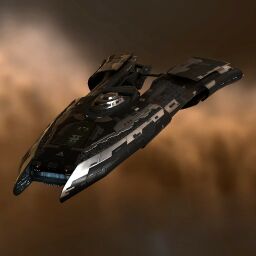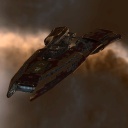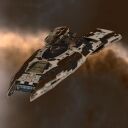More actions
[BOT] Updated as part of the Fitting-cide removal of fittings from the wiki. |
Expanded discussion of skills and tactics. |
||
| Line 83: | Line 83: | ||
==Summary== | ==Summary== | ||
The '''Curse''' is the undisputed king of capacitor warfare. Its range bonuses allow its hefty neuting capacity to reach out to an obscene range. This synergizes well with the standard Amarr TD bonus allowing excellent mitigation of any turret boat DPS, and the standard drone bonus gives cap free, high slot free, selectable and flexible DPS/utility. | The '''Curse''' is the undisputed king of capacitor warfare. Its range bonuses allow its hefty neuting capacity to reach out to an obscene range. This synergizes well with the standard Amarr TD bonus allowing excellent mitigation of any turret boat DPS, and the standard drone bonus gives cap free, high slot free, selectable and flexible DPS/utility. | ||
The | The Curse is universally recognized as a huge force multiplier. Expect to be primaried when flying one in a gang or fleet. | ||
==Skills== | |||
The Curse really needs Recon Ships V to be fully functional: at Recon Ships IV, a pilot is missing out on a set of 80%/20%/20% bonuses for the Curse's primary on-grid purpose. Capacitor Emission Systems IV or (better!) V will help with the capacitor load of energy neutralizers. Strong drone skills and flights of T2 drones are necessary to wring any real DPS out of the Curse, which is a more important consideration in solo and small gang situations. | |||
Like most T2 ships, the Curse has tight fitting requirements, and good [[Fitting Skills|fitting skills]] will be necessary to get the most out of the hull; even a pilot with perfect fitting skills might find themselves needing one or two powergrid modules/rigs if they mount four neutralizers. | |||
==Tactics== | ==Tactics== | ||
For mechanics and general principles of capacitor warfare see [[Capacitor Warfare]]. | |||
The most common fitting flavour is a shield tanked Curse due to the six mid slots and the desire to be able to have speed flexibility and range control. That said, armor-tanked Curses can work when backed up with Guardian logistics, and the ship has excellent innate T2 armor resists. Monied pilots can consider faction or deadspace medium energy neutralizers for significantly longer ranges: a T2 neut on a Curse with a skilled pilot reaches 30km optimal, but (for instance) a Corpum B-Type neutralizer will deliver a 45km optimal—for a price. | |||
In a fleet fight, Curses are a great counter to logistics chains, and the added pressure of their neuts can mitigate or neutralize any practical cap transfer setup. Neutralizers can also work well as a tool to shut down tackle and/or electronic warfare ships on the opposing side. Damage-dealing ships which rely on hybrid turrets, lasers, entropic disintegrators or vorton projectors cannot fire their weapons without capacitor energy; ships relying on missiles, drones, or projectile turrets can keep fighting through neuting, though. | |||
Flown as a solo ship, the Curse is a powerful opponent. However, for this very reason, few ships will willingly engage a solo Curse. Solo Curse pilots must to be wily in their use of their d-scan invisibility to catch targets, and must expect their opponents to try to outnumber and overship them as soon as they are detected: no one sees a Curse as a fair or honorable opponent deserving a measured response. While for fleet/gang use it's worth considering splashing out on faction neuts, the solo Curse's primary limitation is point range: T2 neuts have a 30km optimal on a Curse, but a T2 Warp Disruptor will only reach 24km. In fitting a Curse for solo flight it might be worth prioritizing a longer-ranged warp disruptor over fancier neutralizers. | |||
==Notes== | ==Notes== | ||
==Patch History== | ==Patch History== | ||
Revision as of 12:05, 31 October 2021
 
RELATED UNI-WIKI REFERENCES
|
Built to represent the last word in electronic warfare, combat recon ships have onboard facilities designed to maximize the effectiveness of electronic countermeasure modules of all kinds. Filling a role next to their class counterpart, the heavy assault cruiser, combat recon ships are the state of the art when it comes to anti-support support. They are also devastating adversaries in smaller skirmishes, possessing strong defensive capabilities in addition to their electronic superiority. SHIP BONUSES
Amarr Cruiser bonuses (per skill level):
Ship Attributes
|
Summary
The Curse is the undisputed king of capacitor warfare. Its range bonuses allow its hefty neuting capacity to reach out to an obscene range. This synergizes well with the standard Amarr TD bonus allowing excellent mitigation of any turret boat DPS, and the standard drone bonus gives cap free, high slot free, selectable and flexible DPS/utility.
The Curse is universally recognized as a huge force multiplier. Expect to be primaried when flying one in a gang or fleet.
Skills
The Curse really needs Recon Ships V to be fully functional: at Recon Ships IV, a pilot is missing out on a set of 80%/20%/20% bonuses for the Curse's primary on-grid purpose. Capacitor Emission Systems IV or (better!) V will help with the capacitor load of energy neutralizers. Strong drone skills and flights of T2 drones are necessary to wring any real DPS out of the Curse, which is a more important consideration in solo and small gang situations.
Like most T2 ships, the Curse has tight fitting requirements, and good fitting skills will be necessary to get the most out of the hull; even a pilot with perfect fitting skills might find themselves needing one or two powergrid modules/rigs if they mount four neutralizers.
Tactics
For mechanics and general principles of capacitor warfare see Capacitor Warfare.
The most common fitting flavour is a shield tanked Curse due to the six mid slots and the desire to be able to have speed flexibility and range control. That said, armor-tanked Curses can work when backed up with Guardian logistics, and the ship has excellent innate T2 armor resists. Monied pilots can consider faction or deadspace medium energy neutralizers for significantly longer ranges: a T2 neut on a Curse with a skilled pilot reaches 30km optimal, but (for instance) a Corpum B-Type neutralizer will deliver a 45km optimal—for a price.
In a fleet fight, Curses are a great counter to logistics chains, and the added pressure of their neuts can mitigate or neutralize any practical cap transfer setup. Neutralizers can also work well as a tool to shut down tackle and/or electronic warfare ships on the opposing side. Damage-dealing ships which rely on hybrid turrets, lasers, entropic disintegrators or vorton projectors cannot fire their weapons without capacitor energy; ships relying on missiles, drones, or projectile turrets can keep fighting through neuting, though.
Flown as a solo ship, the Curse is a powerful opponent. However, for this very reason, few ships will willingly engage a solo Curse. Solo Curse pilots must to be wily in their use of their d-scan invisibility to catch targets, and must expect their opponents to try to outnumber and overship them as soon as they are detected: no one sees a Curse as a fair or honorable opponent deserving a measured response. While for fleet/gang use it's worth considering splashing out on faction neuts, the solo Curse's primary limitation is point range: T2 neuts have a 30km optimal on a Curse, but a T2 Warp Disruptor will only reach 24km. In fitting a Curse for solo flight it might be worth prioritizing a longer-ranged warp disruptor over fancier neutralizers.
Notes
Patch History
| A long, long time ago... |
|---|
|
October 2019 Release - 2019-10-15.1 Every Cruiser, Battlecruiser and Battleship now warps faster than before.
|





















